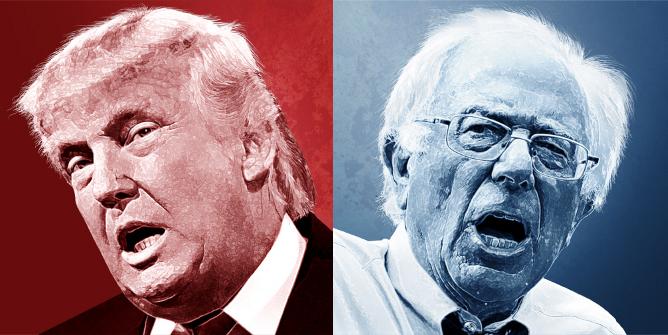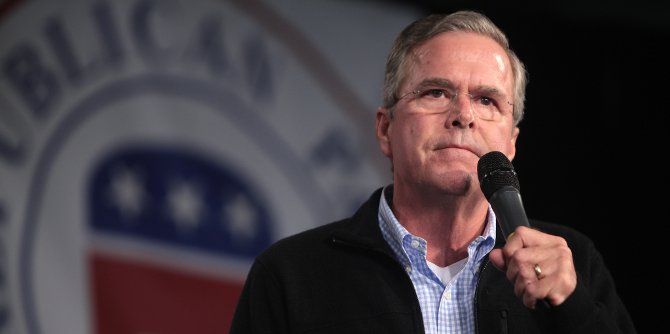 At the beginning of 2015, many political commentators expected that this summer would see the cementing of establishment candidates like Jeb Bush and Hillary Clinton at the head of 2016 presidential election polling. Recent weeks have shown that they were very wrong. Christian Abueg writes that the surprise rise of Donald Trump on the right and Bernie Sanders on the left shows that the decades old debate between style and substance in presidential elections has not gone away.
At the beginning of 2015, many political commentators expected that this summer would see the cementing of establishment candidates like Jeb Bush and Hillary Clinton at the head of 2016 presidential election polling. Recent weeks have shown that they were very wrong. Christian Abueg writes that the surprise rise of Donald Trump on the right and Bernie Sanders on the left shows that the decades old debate between style and substance in presidential elections has not gone away.
If Donald Trump was not leading the polls this summer, the hot button topic for Republicans would be Hillary Clinton’s State Department emails. But with the pageantry that comes with presidential elections, Donald Trump has taken up all the 2016 media oxygen. However, there is quiet grassroots movement brewing in states from Iowa to California, in the form of the campaign of Senator Bernie Sanders, an Independent and self-declared socialist from Vermont, who is seeking the Democratic nomination for President.
Yet what worries most Democratic insiders and strategists is not the fact that Hillary Clinton’s curriculum vitae is inadequate or inexperienced. It is the fact that her private server which has been turned over to the FBI may have some serious government classified information that could potentially lead to criminal charges. Hillary Clinton has been publicly making jokes about the issue; declaring her love for Snapchat by stating “those messages all disappear by themselves” or becoming somewhat indignant when asked if the private server had been “wiped” with her witty response of “like with a cloth or something?” All of these eyebrow raising comments from Secretary Clinton contribute to the narrative that she believes in the letter of the law yet disagrees with its spirit. If the email controversy were to drag on and seriously wound her candidacy, her defeat would not be by one fatal blow, but by a thousand cuts. Moreover, Democrats would not want to walk into the General Election with a ‘wounded warrior’ that could cost them the White House. Such controversies have contributed to rumors of former Vice-President Al Gore jumping into the race and Vice-President Joe Biden is now seeking advice from close confidants about challenging his former Executive Branch colleague.

With all this taking place, the Democratic Party is on fire. Party insiders seem to be mildly panicking, seeking alternatives and quite possibly struggling to coalesce around Hillary Clinton, not just because of her controversial emails but because of concerns about her lack of authenticity and apparent inability to relate to everyday Americans. However, with the little light that shines on Governor Martin O’Malley, Governor Lincoln Chafee, or even Senator Jim Webb, all of who are seeking the Democratic nomination, Senator Bernie Sanders has benefited the most from Secretary Clinton’s ‘scripted’ and ‘machine-like’ candidacy. What voters find most attractive about Sanders is his plain consistency and his far leftist ideology, both of which is extremely scarce in American politics. Sanders is drawing thousands of supporters because of his ‘socialist’ vision for America running on a platform of college free debt, taxing wealthy millionaires and billionaires, breaking up the big banks, and supporting a single payer health care plan. All of which is attractive to first time voters and those who feel that the financial collapse which protected the ‘fat-cats on Wall Street’ was unacceptable.
Sanders is running on the platform that his ideology has been consistent from his beginnings in politics to the present. But even with this resurgence of ideology in American politics, it is no use if you cannot use your ideology to govern in Congress or in the White House. Perhaps what is most worrying to me as millennial is the lack of ‘new blood’ in the Democratic Party. All of these candidates ranging from Mrs. Clinton, to Mr. Sanders, to Mr. Chafee are not part of a new wave of politics which then-Senator Obama was so successfully able to tap back in 2008. And with names such as Joe Biden and Al Gore being tossed around it seems that this only reinforces the lack of a generational selection in the Democratic Party’s 2016 Presidential field. Compared to that of the Republicans, it ranges from real-estate and reality TV tycoon Donald Trump, union-busting Scott Walker, or the youthful vigor of Florida Senator Marco Rubio. Not to mention the GOP also shares its own dynasty candidate, Governor Jeb Bush. However, if politics is really the blood-sport many claim it to be and its main point is to win elections, then by that account the lack of choice in the Democratic Party is beneficial. It should be clear that the Democratic Party would be clever to rally around Hillary Clinton as its sole candidate since she has the greatest chance to keep the White House blue.
For more than fifty years the debate most Americans have been having in each election is not one of ideology or policy preferences, but of style over substance. Famously, 1960s Kennedy-Nixon debate proved this; those who listened to the debate between Senator Kennedy and Vice-President Nixon on the radio felts that Nixon won that debate. Yet for those who saw the first televised debate in American history, it was clear that the young Kennedy won against the sweaty and sickly Nixon.
This clash of style over substance has haunted America’s elections for decades and 2016 is no different. A bombastic ‘tell it like it is’ Donald Trump many find engaging and unique has shown that his style and candor outweigh his specific policy stances, which is reflected in his solid lead in the polls. And though Senator Sanders’s track record and substance is politically appealing to many left-wing and Progressive Democrats it would still have to compete in swing-states like Ohio, Florida, Virginia, and Iowa in the heat of a General Election against a Governor Walker, Governor Bush, Governor Kasich, or Senator Rubio.
In the end, political laws of physics such as electability will indeed apply as they do in every presidential election. At some point these voters have to cast a vote – at the moment their support for Trump on the right and Sanders on the left is telling us that they want to send a message. But is a message more important than winning an election? Is nominating a candidate such as Donald Trump or Bernie Sanders worth losing a general election and four years in the White House? For both their parties, the answer may well be ‘no’.
Please read our comments policy before commenting.
Note: This article gives the views of the author, and not the position of USAPP – American Politics and Policy, nor of the London School of Economics.
Shortened URL for this post: http://bit.ly/1MigHRI
_________________________________
 Christian Abueg – LSE Government
Christian Abueg – LSE Government
Christian Abueg is an MSc Candidate at the Department of Government in the LSE and Political Science reading Public Policy and Administration with a stream of Public Management. His research interests include American Law and Public Policy, American Political Elections, and the bridge between building a better Public and Private consortium. He tweets @ChristianAbueg.





2 Comments